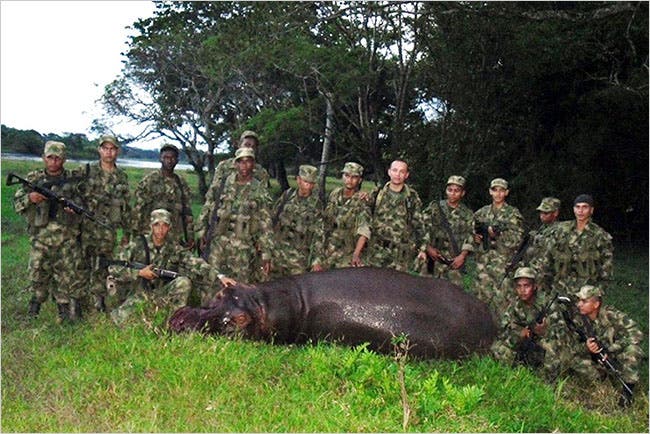Colombia’s hippos are a well-documented problem. Growing astonishingly fast in number, potentially devastating to the local ecosystem and perhaps lethal to humans, plenty of solutions have been proposed.
None have stuck.
The four curiosities brought by Pablo Escobar in the 1970s to his ranch near Medellín have grown to an extended family of at least 120 individuals. Left unchecked, they could reach 200 by the end of the decade and spread to a living area of over 13,500 square kilometers. Some have already been spotted over 240 kilometers from Hacienda Nápoles, where Escobar once lived.
Differences in their sexual maturity and growth from their African brethren, as well as environmental factors, have seen calls for them to be recognized as their own sub-species.
And the problems are accelerating. Hippos kill more people than any other mammal in Africa but attacks on humans had never really materialized in Colombia. At least until May 2019 when one local farmer was chased, mauled and severely injured near Escobar’s former estate.
Here, InSight Crime considers four options for dealing with this issue long-term.
Shoot the Hippos
According to a team of Colombian environmental experts interviewed by the BBC, Escobar’s hippos should be culled quickly before the situation is out of control.
Without natural predators such as the lions and crocodiles that feed on them in Africa, as well as a plentiful food supply, the hippos will continue to multiply. The worst-case scenario could see them reproduce to reach around 1,400 individuals by 2034. To prevent this, the team recommends that around 30 hippos should be culled every year.
SEE ALSO: Coverage of Environmental Crime
The one problem with this approach is that local residents seem fiercely opposed to it. In 2009, the government allowed the killing of one hippo, named “Pepe,” which had escaped the ranch. Two professional hunters brought it down and soldiers posed with its carcass.

Protests quickly followed with activists picketing the Environmental Ministry building in Bogotá. There have been no further attempts to cull them since.
Sell or Extradite the Hippos
A recent investigation by the online news site, Vorágine, found that traffickers had allegedly been capturing baby hippos to illegally sell them to collectors. Supposedly, one of the main attractions is to own animals connected to Pablo Escobar and his opulence. The sellers are reportedly peddling the captured babies for up to five million Colombian pesos ($1,300).
However, local police poured water on this rumor, stating that it would be impossible for traffickers to steal baby hippos “under our noses,” adding that rumors of hippos being sold had been around for years without proof.
Another theory has been proposed: ship them back to Africa or find a new home for them.
“They are already not African,” stated Nataly Castelblanco, a Colombian expert in nature conservation, in an interview with El Tiempo. According to her, the hippos have already taken on localized characteristics and have acquired bacteria unique to their current habitat. Sending them back to parts of Africa could have a serious knock-on effect on local wildlife by bringing in new viruses, for example.
Eat the Hippos
According to a local resident interviewed by Vorágine, one community cooked one of the animals which had been killed by an electric fence. The animal was reportedly chopped up and divided among residents, who cooked it at home.
One biologist confirmed the story to Vice, which reported that hippo meat can be highly tasty and could fit in quite well with traditional, local diets. Indeed, hippos are sometimes hunted and eaten in the Democratic Republic of Congo and other countries, although it is often illegal and dangerous to do so.
SEE ALSO: Wildlife Under Threat: Traffickers Target Colombia’s Vital Fauna
Castrate the Hippos
Another option would be to artificially sterilize the hippos. But to be done successfully, the entire male population would have to be found, caught and operated on. The dangers of approaching a hippo are already well-documented but finding dozens of individuals in the wild, sterilizing them, and keeping track of any new births in the meantime would be a daunting task.
Due to hippos’ highly territorial nature, males in Colombia have spread further afield to find uncontested territory. It was reportedly due to one male, nicknamed “El Viejo,” controlling Hacienda Nápoles, that Pepe left the ranch, leading to his eventual death.
A previous attempt also highlighted another problem: the cost. One 2009 report stated that, as an experiment, one male was caught, anesthetized and castrated. The whole adventure cost $50,000, according to the Yale Politic.
The researchers also found another significant risk. Due to their size and body fat, it is difficult to anesthetize hippos for long.
And the prospect of a grumpy bull hippo waking up in the middle of having his family jewels removed may make this the worst idea of all.

